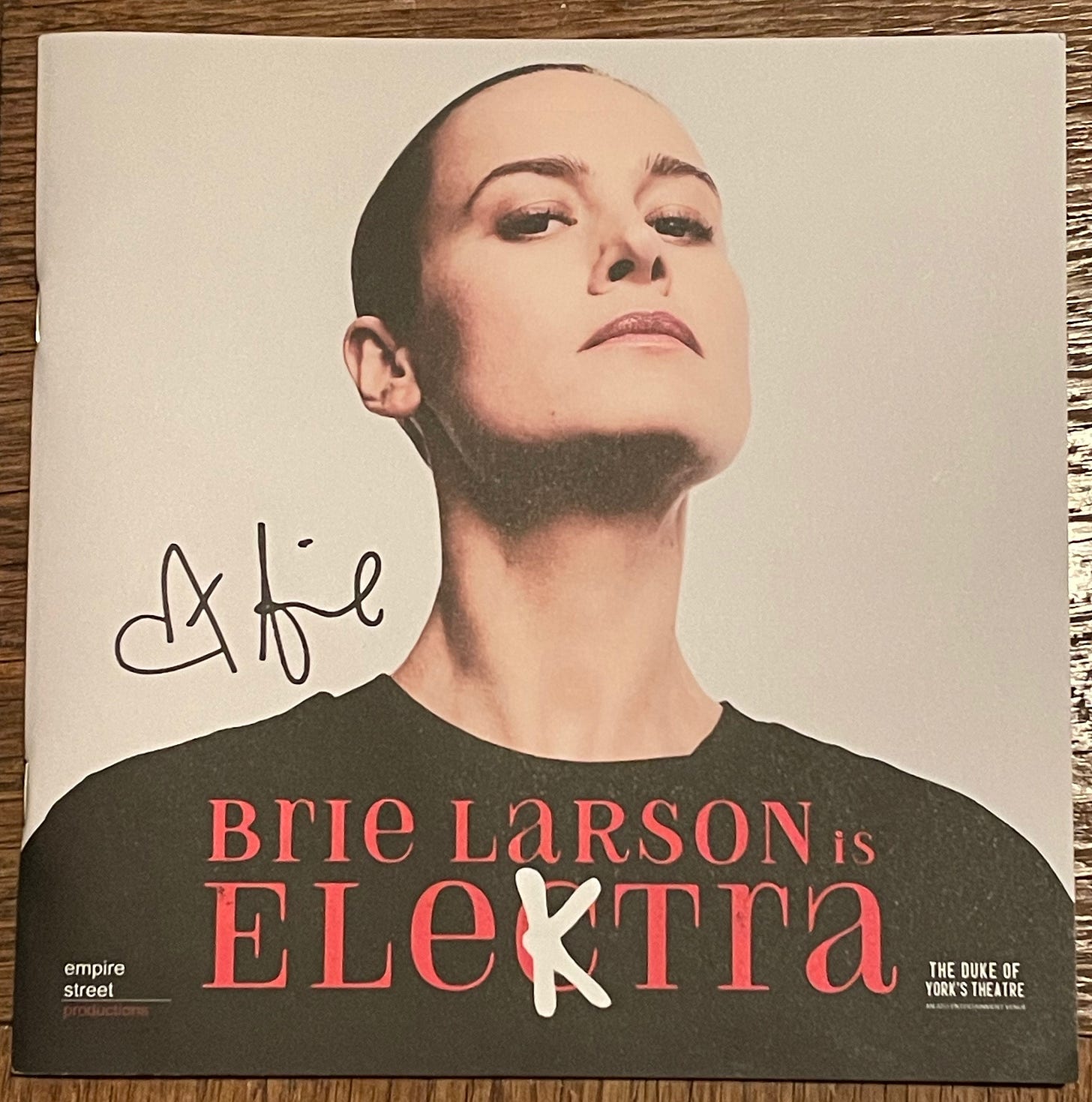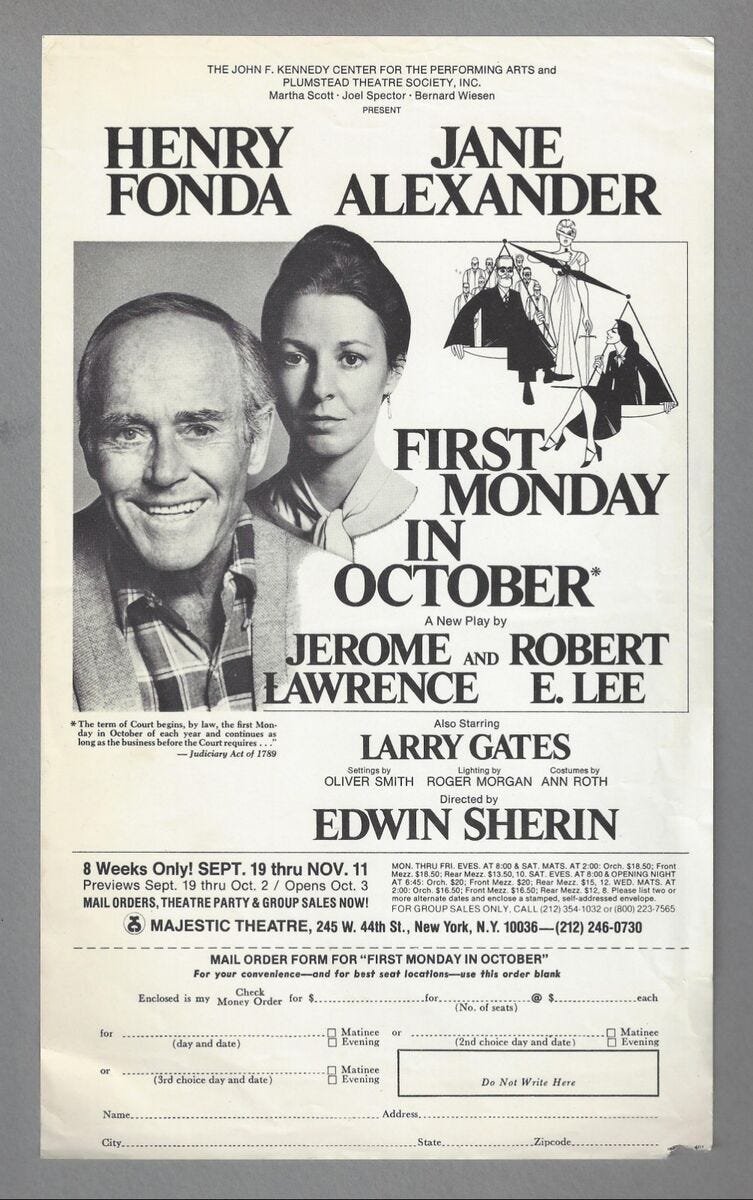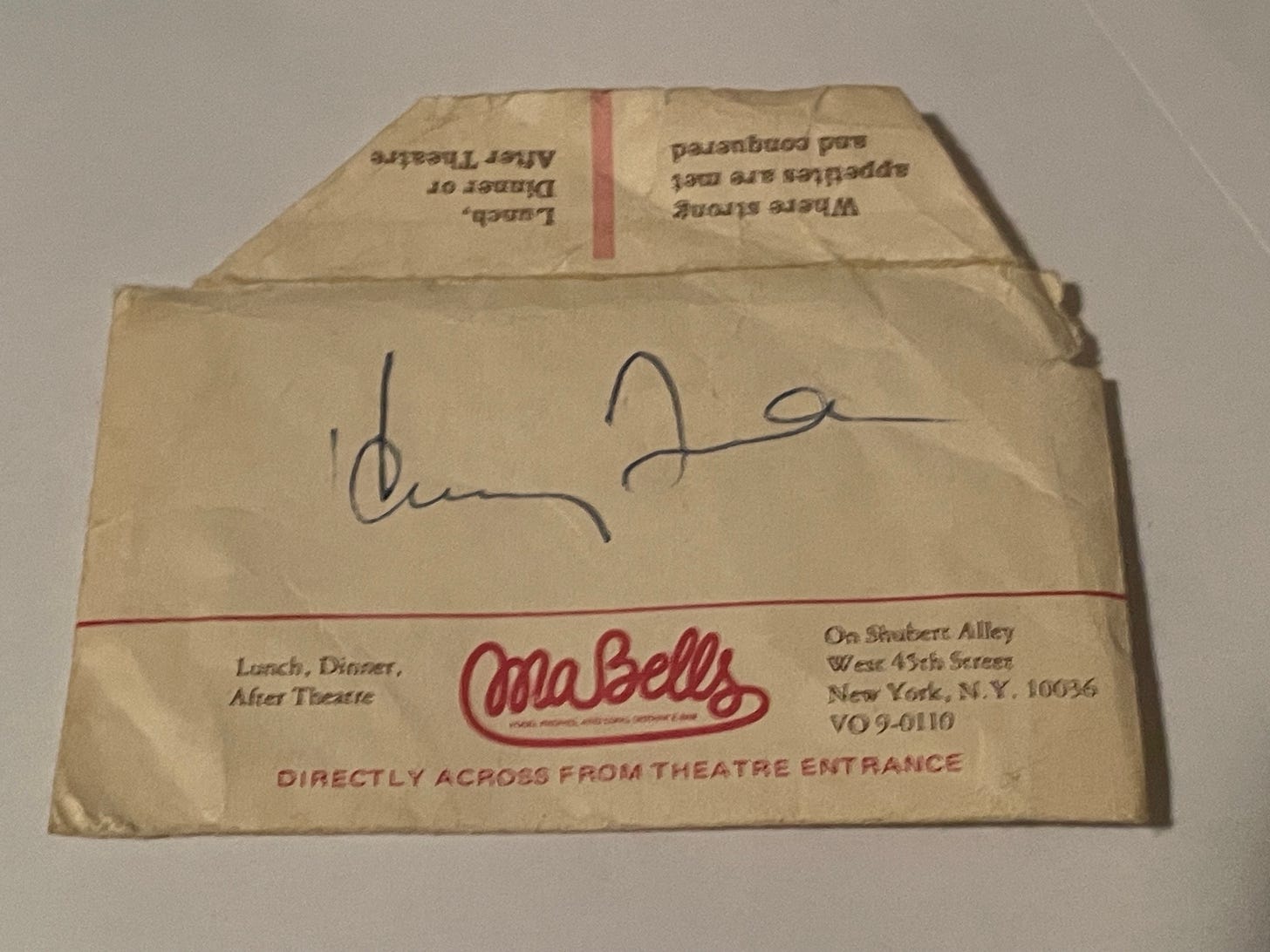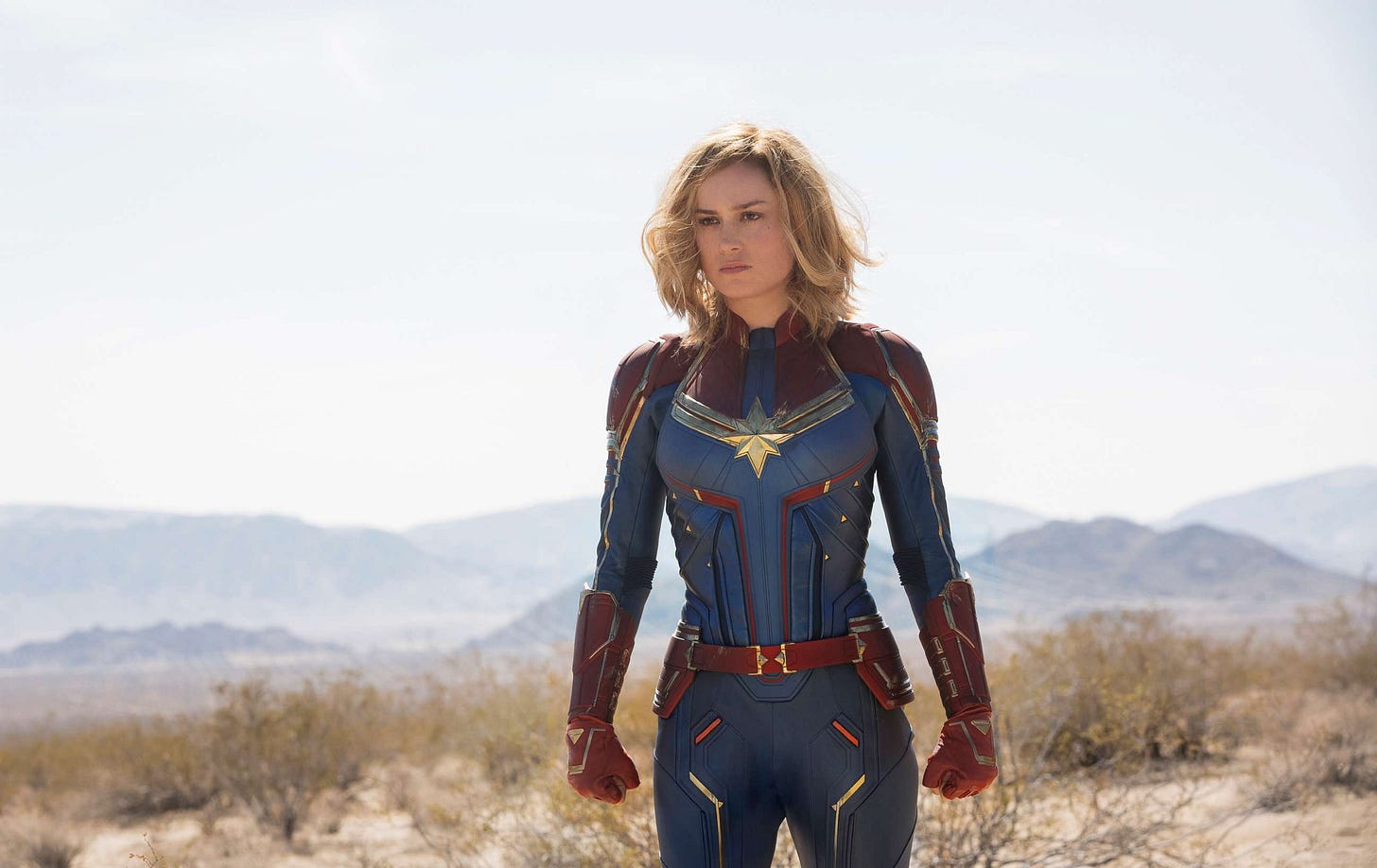The hand on the crook of my arm belonged to none other than Captain Marvel herself, outside the stage door ten days ago at the Duke of York’s Theatre in the West End.
When I was a teenager, my friends and I started going into the city on our own to see Broadway shows. We fell in love with theater, and afterward we would wait around the stage door to get our Playbills signed. We would get twofer matinee tickets at the TKTS booth in Father Duffy Square, which back then were about ten or twelve bucks, and sometimes pay five dollars for standing room at a second show the same night.
Autographs were great, but we thrived on personal interaction. In the summer of 1978, we cornered Danny Aiello outside the Little Theatre after seeing Gemini and he said, “Walk with me,” so we rushed down West Forty-Fourth St. with him, raving about the comedy and trying to act like so many of the tough dudes he portrayed in movies. We apparently had harassed Jack Lemmon the first time we met him that same summer; after seeing Tribute at the Brooks Atkinson and getting his autograph, about a month later we were on West Forty-Seventh St. when, lo and behold, there was Jack, clearly not feeling well, dabbing his nose with a tissue, reminding us of Felix Ungar in The Odd Couple; he looked up, saw us, and said with a sigh, “Oh no, not you guys again.”
When we checked out The Crucifer of Blood at the Helen Hayes that fall, while everyone else was lining up for Paxton Whitehead’s signature — he was Sherlock Holmes in the mystery — one of his costars emerged from the stage door and was all by herself, so I asked for her autograph partly because no one else was requesting it; years later I pulled out that Playbill and saw the name “Glenn Close” in cursive on the cover.
Inside this envelope with Henry Fonda’s signature were autographs from comedian Alan King, sportscaster Bill Mazer, and tennis star Renée Richards that I got at the 1979 US Open (photo by twi-ny/mdr)
Later in 1978, we were outside the Majestic early to see Henry Fonda and Jane Alexander in First Monday in October just when His Royal Hankness was going into the theater; we didn’t have the Playbill yet, so I asked him to sign the tiny envelope the tickets had come in. Following the show, we waited for Alexander; she was so impressed by my friend Seth’s theater knowledge that she invited us back to her apartment for tea.
In 1979, it was Fritz Weaver in The Price at the Playhouse Theatre; thirty-five years later, at my day job, I found out that one of my colleagues was his daughter. I told her about getting his autograph after that show and chatting with him twenty years ago about his two Twilight Zone episodes at a party at Symphony Space; she surprised me with a signed Fritz Weaver card and later invited me to his memorial service at that Upper West Side theater.
In 1980, it was Tom Conti in Whose Life Is It Anyway? at the Royale and Jim Dale — and Glenn Close! — in Barnum at the St. James. About six years later, I got a thumbs-up from Burt Young after seeing him, Ralph Macchio, and Robert De Niro in Cuba and His Teddy Bear at the Circle in the Square Downtown.
Looking back now, it might have all begun with my parents bringing me home a Playbill signed by George C. Scott after they had seen him in Sly Fox at the Broadhurst in 1976. The next year they took me to see Frank Langella in Dracula at the Martin Beck; at intermission, my mother told me to grab a front-row seat that was empty. I was worried I’d get caught, but I did it nonetheless. After the curtain call, my mother encouraged me to get Langella’s autograph; when he was signing my Playbill, I did not tell him about how much of his spittle had rained on me during the second act. Almost forty years later, I shared that story with him at the Drama Desk Awards — without mentioning the theater shower.
I haven’t asked for an autograph since those days, and I have never taken a selfie with a famous person. Seeing a show and then writing about it are more than enough. If my theater companion wants an autograph and/or selfie, I will wait with them but not get anything for myself, although I often will give the actor a compliment if they’re right there in front of me. After Of Mice and Men in 2014, a huge crowd had gathered for James Franco, who was posing with fan after fan behind barricades, a black SUV idling nearby for him. We observed Chris O’Dowd, who was Lennie to Franco’s George, signing a few Playbills and then, backpack over his shoulder, starting to head off down the street by himself. I went over and congratulated him, as nobody else had noticed the Emmy-winning Irish actor and comedian.
Brie Larson has played Captain Marvel in several MCU movies
My wife and I were in London for a cousin’s wedding, so we decided to catch a few shows while we were there. On the fifth night, we saw Oscar and Emmy winner and Bond villain Rami Malek (Mr. Robot, Bohemian Rhapsody) as the title character in Sophocles’s Oedipus at the Old Vic, opposite Indira Varma (Game of Thrones, Hard Target) as Jocasta. Sigmund Freud named a complex after the Greek king of Thebes; explaining the Oedipus Complex, the Austrian neurologist wrote, “To express the matter boldly, it is as though a sexual preference becomes active at an early period, as though the boy regards his father as a rival in love, and as though the girl takes the same attitude toward her mother — a rival by getting rid of whom he or she cannot but profit. . . . According to my experience, which is now large, parents play a leading part in the infantile psychology of all later neurotics, and falling in love with one member of the parental couple and hatred of the other help to make up that fateful sum of material furnished by the psychic impulses, which has been formed during the infantile period, and which is of such great importance for the symptoms appearing in the later neurosis.”
The previous Thursday night, we had checked out Oscar and Emmy winner and Captain Marvel portrayer Brie Larson (Room, Lessons in Chemistry) as the title character in Daniel Fish’s Elektra, an experimental take on Sophocles’s Electra, which has its own complex as well: Freud’s friend and later rival, Swiss psychiatrist Carl Jung, coined the term “Electra Complex,” which deals with a daughter’s jealousy of her mother for her father’s affections, a kind of reversal of the Oedipus Complex.
We had previously seen Fish’s controversial adaptation of Oklahoma! at Circle in the Square in 2019 as well as his White Noise at NYU Skirball that same year, a radical multimedia interpretation of sections of Don DeLillo’s award-winning novel — before the show, I greeted DeLillo, who was sitting with his wife two rows in front of us, then eavesdropped as Fish came over to say hello to them — and A (radically condensed and expanded) Supposedly Fun Thing I’ll Never Do Again at the Chocolate Factory in 2015, a brilliantly devised piece that had a tennis-ball machine pelting actors as they performed lines spoken by author David Foster Wallace from audiobooks, interviews, and speeches.
Fish’s Elektra, based on the 2001 translation by Canadian poet Anne Carson, was both elektrifying and mystifying. Larson is onstage for the entire seventy-five minutes, speaking, singing, yelling, and whispering into a microphone, head shaved, wearing a white Bikini Kill T-shirt, for the original 1990s riot grrrl band that my wife and I saw on its thirty-fifth anniversary tour at the Paramount last fall. (Similarly, Fish had Gabrielle Hamilton reinterpret the Agnes de Mille ballet in Oklahoma! as a furious solo while wearing a white shirt that read, “Dream Baby Dream,” referencing a song by Suicide, the glam punk duo we saw in 2007 at the South Street Seaport.)
Larson channels Sinéad O’Connor and Laurie Anderson as she moves around the partially revolving set, along with a Greek chorus of six women and, above them, a hovering blimp. For purists, Stockard Channing delivers a pitch-perfect monologue as Elektra’s mother, Clytemnestra, who has murdered her husband, Elektra’s father, Agamemnon, and fears her son, Orestes (Patrick Vaill), is dead. Fish even throws in some of Beyoncé’s “Daddy Lessons,” which features the lyrics “He held me in his arms / And he taught me to be strong / He told me when he’s gone / ‘Here’s what you do: / When trouble comes to town / And men like me come around’ / Oh, my daddy said shoot / Oh, my daddy said shoot.”
Brie Larson stars as a punk Elektra at the Duke of York’s Theatre in London (photo by Helen Murray)
After the curtain call — during which, contrary to every Broadway show nowadays, there was no standing ovation yet obvious appreciation — my wife and I left the theater and were surprised that there were only about a dozen people huddled by the stage door, fighting off the cold to get autographs. A woman who might have been the stage manager explained that Ms. Larson would be out momentarily, that she would sign only Elektra items, and that no photos or video were allowed.
I figured, why not? We decided to hang out a few minutes and see what happened. I wasn’t going to ask for an autograph, but when I was suddenly just a few feet away from Larson, with no one in between, Ellen thrust the program into my hand and I approached her.
As she signed the program, I told her that I thought Daniel Fish was a genius. Seemingly happy that I hadn’t mentioned anything Marvel related, she agreed, nodding to the stage manager. I then added that I had previously seen Oklahoma! and White Noise. When I mentioned the latter, Brie let out a gasp and grabbed my inner elbow. “You saw White Noise?!” she said in wonder. I nodded. She turned to the stage manager and, still holding my arm, declared, “We must tell Daniel!” The stage manager heartily replied, “Yes, we must tell him!”
When we got back to the hotel, I looked up White Noise; it had apparently played very few performances, only at a festival in Germany and then at Skirball as part of the 2019 Under the Radar series.
As thrilling as the experience was with Larson, and it was thrilling, I am not planning on returning to my adolescent habit of getting autographs after shows.
But for that brie(f) moment in London, I felt like a kid again, bonding with a (super)hero.
[You can follow Mark Rifkin and This Week in New York every day here.]









The benefits of growing up in NYC... Puts my own upbringing at the Jersey shore in stark relief--I think of my excitement when I spotted Captain Noah, host of a Philly kids' show, at a restaurant. Great piece (:as always).
Mark, this is a beautiful piece. How sweet and wonderful to have been invited to the apartment of Jan Alexander as a teen!!